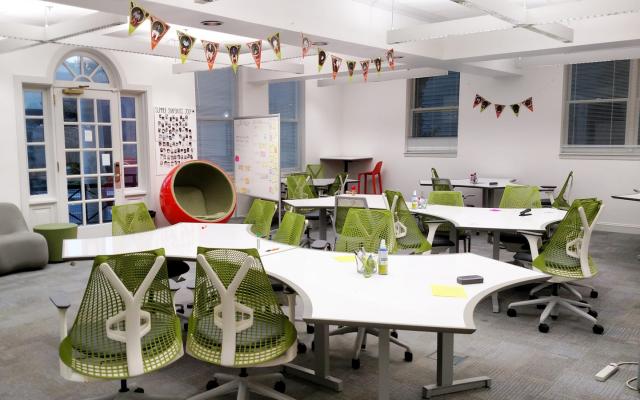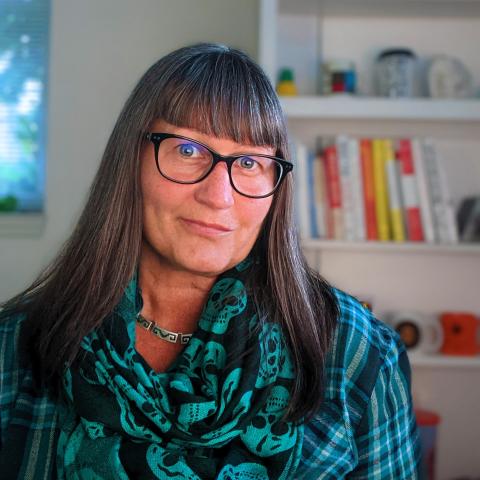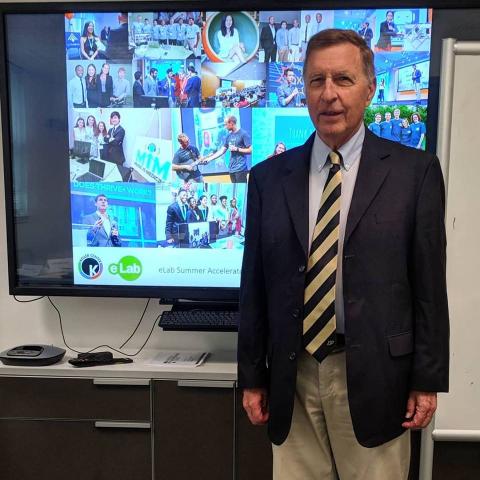
In late January, the Keller Center offered six teams of graduate and undergraduate students positions in the eLab Accelerator Program. Twenty-seven young entrepreneurs would be devoting ten weeks this summer to building their startup ventures. However, as soon as those acceptance emails went out, the Keller eLab administrators were brainstorming on how they were going to offer an intensive accelerator experience during a global pandemic.
In its ninth year, eLab provides students with tools and resources to develop their startup ideas and build viable, scalable ventures. In past years the cohorts spent June through August living and working together on campus. The Princeton Entrepreneurial Hub on Chambers Street served as their co-working home away from home and was usually buzzing with energy from morning to late in the evening. Teams would spend their days (and nights) meeting with mentors, attending skill-building workshops, constructing websites or apps, eating meals and socializing together, creating logos and market materials, surveying potential customers and partners, interacting and learning from one another, and preparing for the end of program pitch event, Demo Day. So how could this program work remotely?
The first point of business was to ensure that the students were on board with virtual eLab 2020. "We understood that some students might not have reliable internet access or a quiet workspace. We also understood there was an element of anxiety and disappointment to factor in. However, the whole 2020 cohort responded with enthusiasm and energy proving their entrepreneurial spirit was strong," recalls eLab Program Manager Stephanie Landers.
Landers and Program Coordinator Manda Ryan were tasked with reformulating the Accelerator in just a few short weeks, something they usually spent the academic year honing. "We had to work fast to coordinate everything, and everyone involved, as well as find and vet technology that could help maintain the integrity, value, and objectives of our program," said Ryan.
After leaving campus in mid-March, Landers and Ryan not only restructured the program, they also took the opportunity to enhance the experience by building in a new component. This year, the eLab has an advisory panel, a group of entrepreneurs, alum, and investors with a wide range of experience and know-how who meet with the cohort weekly via Zoom to serve as a sounding board as teams develop their ventures. "Having this weekly feedback has proven to be a great asset to the teams," remarked Ryan.
"We often hear from people who want to be a part of supporting our student entrepreneurs, but they don't have the bandwidth or are unable to travel back and forth to campus. Now that we are virtual and the vast majority of people are working from home, we can access advisors and mentors worldwide," said Landers. Although she admits that nothing can replace the energy and value of being in the same room with a buzzing group of entrepreneurs, she feels that the virtual platform allows for a different kind of buzz and energy.
The program kicks off with an intensive three-day Boot Camp run by Ed Zschau '61, former High-Tech Entrepreneurship Professor and current Interim President of Sierra Nevada University. Zschau is acutely aware of the obstacles in running a virtual accelerator, from team members who may be struggling with different time zones and work schedules to the lockdowns that have made holding productive face-to-face meetings with potential customers and partners impossible. "For me, if I were meeting in the Hub with teams, each such visit to Princeton would require 26-30 hours of travel round trip." In past years, Zschau would make the trek out to Princeton three times during the summer. "The Zoom meetings with my team are typically one hour each week and have been very easy and effective. Todd Laurence '86 held a webinar from California regarding sales and marketing for all of the teams. Such educational and interactive sessions are very effective and inexpensive while operating remotely, which I see as a great benefit to the cohort."
The bottom line, says Zschau, is that "this summer, we are undertaking a 'great experiment' to see if startup companies can be successfully formed and launched when the founders are remote from one another. If that is true, it has significant implications for the future: It would mean that it may not be necessary to live in expensive areas like Silicon Valley or NYC or even be co-located with other founders to start up a new venture. It could open a great many possibilities." eLab has six teams of entrepreneurs eager to prove this "experiment" to be a success.
Join us on Wednesday, August 12 at 11:30 am as the 2020 cohort pitch their startup ideas to the world at the 9th Annual eLab Demo Day. All are welcome, register for log-in details.


